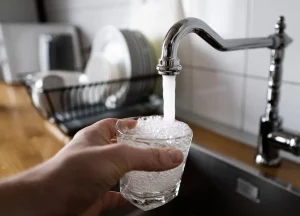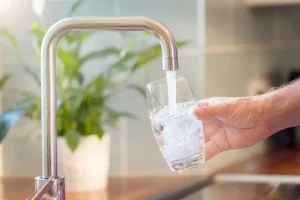Okay, but how can water filters help the environment?
It’s clear that plastic water bottles, especially those with plastic caps, pose a threat to the environment. We could reuse them or recycle them, but it is best to reduce their impact before they happen.
Water filters are a great way to reduce single-use items like plastic bottles and fossil fuel consumption. They also help lessen the wear on appliances. These benefits are discussed in greater detail.
1. Water filters help reduce single-use plastic water bottles
Plastic water bottles make it easy to get clean water anywhere you go, at home or on the move. Plastic water bottles can cause damage to the environment and aquatic life, as well as our health, if they are thrown away. Plastic does not decay, as we said earlier. Sometimes, it can break down into microplastic particles which can be hard to track and easily infiltrate our food and water.
A water filter is a great tool for reducing plastic waste. It is affordable and easy to use. Water filters can be used to provide clean drinking water and reduce single-use plastic water bottles. You can combine a water filter system such as a whole-house system, countertop filter or under-sink filter with a reusable water container to have clean and great tasting water wherever you are. To reduce plastic waste, it is a good idea to make your reusable water bottles from metal or glass.
2. Water filters protect appliances
Water filters not only reduce single-use plastic water bottles, but also provide long-term benefits such as extending the life of your appliances. Some water filters come with sediment filters. These filters remove dirt, dust and other particulate matter from water-using appliances like water heaters and refrigerators.
Unfiltered water can cause damage to appliances as well as increase their energy consumption. A water filter can reduce sediment buildup and other contaminants, which will prolong the life of your appliances, as well as help them to be more energy efficient.
If you have an electric heater, for example, the heater can collect sediments. The deposits build up over time and can cover the heating element. This reduces the efficiency of the hot water tank. Because the heating element on the lower side of the heater is not working properly, the water heater will use more electricity to heat water. A water filter can reduce sediment buildup and help you save money on your electricity bill.
Protecting appliances with a water filter can help you save time and money, and also reduce pollution due to excess energy generation.
3. Water filters reduce fossil fuel consumption
Plastic water bottles are made of fossil fuels and natural gases. This process requires 17 million barrels per year, not including transportation. Additionally, 2.5 million tons of carbon dioxide are released each year by bottling.
This means that by using an eco-friendly water filter we can reduce our dependence on fossil fuels and produce less plastic. We can reduce our carbon footprint and greenhouse gas emissions by reducing plastic production.











